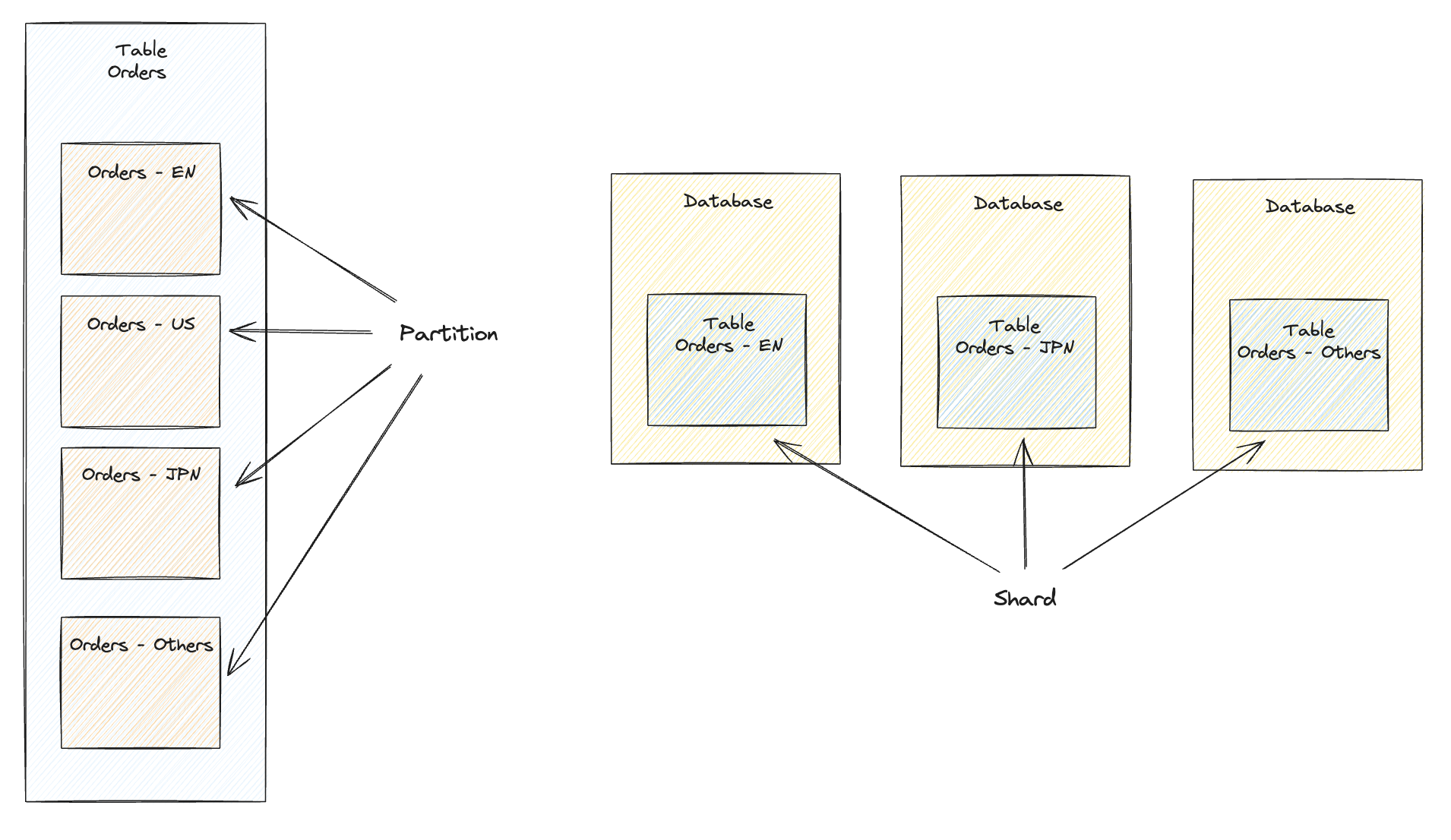Scaling Databases - A Guide to Sharding and Partitioning
In today’s data-driven world, applications generate and handle enormous volumes of data. When datasets grow to hundreds of millions or even billions of rows, traditional database architectures can struggle to maintain performance and scalability.
To efficiently manage and distribute such massive datasets, it’s essential to implement techniques like sharding and partitioning.

In this post, we’ll explore these concepts and demonstrate how to implement them using PostgreSQL and the Citus extension.
Partitioning
Partitioning: Is the division of a database table into smaller, more manageable segments or partitions, based on specific criteria such as range, list, or hash, to improve performance and management.
Why? Partitioning is used to improve query performance, reduce index size, and optimize data management by dividing large tables into smaller, more manageable partitions.
Sharding
Sharding is a concept and distributed table is a concrete implementation of sharding.
Shard: Is a small, independent piece of data that comes from a larger dataset.
Sharding: Is the process of splitting a large dataset into smaller, more manageable pieces (shards), which are then distributed across different servers or nodes in a database cluster.
Distributed Table: Is a logical table in a distributed database system where the data is spread across multiple nodes or servers.
For example, distributed database system (e.g. Citus), allows you to shard (split) large tables based on a column (sharding key) and distribute these shards across multiple nodes in a cluster.
Why? Sharding is used to improve performance and scalability by distributing data across multiple servers. It allows you to scale out your database horizontally by adding more servers to the cluster.
PostgreSQL and Citus
Sharding and distributed table require a database that supports them. In this example, PostgreSQL with Citus extension is used.
Postgres is a relational database that supports SQL. Citus is an extension that transforms Postgres into a distributed database. Citus is a horizontally scalable extension for PostgreSQL that distributes data and queries across multiple nodes.
Data is sharded and distributed among the worker nodes based on the sharding key. Each shard is stored on one or more worker nodes, depending on the replication factor. This means that each worker node holds a subset of the data, not a full copy of the entire distributed table.
Sharding data always depends on the use case and the most likely way the data will be queried
In Citus, you can’t explicitly define which specific keys go to which shard or worker. Citus distributes data using a hash-based sharding mechanism on the specified sharding key.
- Hashing the Key: When you insert a row, Citus hashes the value of the sharding key.
- Shard Assignment: The hash value determines which shard the data belongs to.
- Shard Placement: The shard is then placed on one of the worker nodes, distributing data evenly across workers based on the hash values.
Example with Payment Service Provider Events
In the example, we have a simple payment service provider event data. Events are different types of events in a payment workflow, such as AUTHORISATION, CAPTURE, CANCELLATION, and REFUND.
In this example the data is sharded by the event’s psp_name and partitioned by the event’s event_timestamp. This means that events from the same payment service provider are stored together, and events are partitioned by year.
Queries can be done over cross-shards, but they are slower than querying data from a single shard. If queries are performed across many partitions, performance is slower than querying data from a single unpartitioned table.
SQL Example (PostgreSQL + Citus Extension)
We’ll use Docker Compose to set up a local Citus cluster with one master and two worker nodes.
docker-compose.yml:
version: '3.8'
services:
citus_master:
image: citusdata/citus:latest
environment:
POSTGRES_USER: citus
POSTGRES_PASSWORD: password
POSTGRES_DB: events_db
ports:
- "5432:5432"
command: postgres -c shared_preload_libraries=citus
citus_worker_1:
image: citusdata/citus:latest
environment:
POSTGRES_USER: citus
POSTGRES_PASSWORD: password
POSTGRES_DB: events_db
depends_on:
- citus_master
ports:
- "5433:5432"
command: postgres -c shared_preload_libraries=citus
citus_worker_2:
image: citusdata/citus:latest
environment:
POSTGRES_USER: citus
POSTGRES_PASSWORD: password
POSTGRES_DB: events_db
depends_on:
- citus_master
ports:
- "5434:5432"
command: postgres -c shared_preload_libraries=citus
Start the containers with Docker compose
docker compose up
Connect to the master node with psql -h localhost -U citus -d events_db or use an IDE for databases.
Execute SQL commands:
SET citus.shard_count = 32;
SET citus.shard_replication_factor = 1;
-- Add worker nodes to the Citus cluster
SELECT master_add_node('citus_worker_1', 5432);
SELECT master_add_node('citus_worker_2', 5432);
-- Create a distributed table with partitioning for payment service provider events
-- PRIMARY KEY: include psp_name sharding column and event_timestamp partitioning column
CREATE TABLE psp_events (
event_id serial,
psp_name text,
user_id int,
country text,
transaction_amount decimal,
currency text,
event_type text,
event_timestamp timestamp
PRIMARY KEY (event_id, event_timestamp)
) PARTITION BY RANGE (event_timestamp);
-- Create partitions for each year
CREATE TABLE psp_events_2023 PARTITION OF psp_events
FOR VALUES FROM ('2023-01-01') TO ('2023-12-31');
CREATE TABLE psp_events_2024 PARTITION OF psp_events
FOR VALUES FROM ('2024-01-01') TO ('2024-12-31');
-- Create a default partition for events that don't fit into the other partitions
CREATE TABLE psp_events_default PARTITION OF psp_events DEFAULT;
-- Distribute the table by the sharding key `psp_name`
SELECT create_distributed_table('psp_events', 'psp_name');
SELECT truncate_local_data_after_distributing_table('psp_events');
-- Insert more data into 2023 partition
INSERT INTO psp_events (psp_name, user_id, country, transaction_amount, currency, event_type, event_timestamp)
VALUES
('Adyen', 3, 'USA', 120.00, 'USD', 'AUTHORISATION', '2023-03-15'),
('Stripe', 4, 'UK', 180.00, 'GBP', 'CAPTURE', '2023-06-22'),
('Square', 5, 'DE', 90.00, 'EUR', 'REFUND', '2023-09-30'),
('PayPal', 6, 'FR', 200.00, 'EUR', 'CANCELLATION', '2023-12-10'),
('Adyen', 12, 'USA', 85.00, 'USD', 'AUTHORISATION', '2023-07-12'),
('Stripe', 13, 'IT', 155.00, 'EUR', 'AUTHORISATION', '2023-08-19'),
('Square', 14, 'ES', 75.00, 'EUR', 'CAPTURE', '2023-09-25'),
('PayPal', 15, 'NL', 210.00, 'EUR', 'REFUND', '2023-11-02');
-- Insert more data into 2024 partition
INSERT INTO psp_events (psp_name, user_id, country, transaction_amount, currency, event_type, event_timestamp)
VALUES
('Adyen', 7, 'USA', 130.00, 'USD', 'AUTHORISATION', '2024-01-05'),
('Stripe', 8, 'UK', 160.00, 'GBP', 'CAPTURE', '2024-04-17'),
('Square', 9, 'DE', 110.00, 'EUR', 'REFUND', '2024-07-25'),
('PayPal', 10, 'FR', 220.00, 'EUR', 'CANCELLATION', '2024-11-03'),
('Adyen', 16, 'CA', 145.00, 'CAD', 'AUTHORISATION', '2024-02-14'),
('Stripe', 17, 'AU', 175.00, 'AUD', 'CAPTURE', '2024-05-20'),
('Square', 18, 'NZ', 95.00, 'NZD', 'REFUND', '2024-08-10'),
('PayPal', 19, 'SE', 250.00, 'SEK', 'CANCELLATION', '2024-10-22');
-- Insert more data into default partition
INSERT INTO psp_events (psp_name, user_id, country, transaction_amount, currency, event_type, event_timestamp)
VALUES
('PayPal', 11, 'USA', 140.00, 'USD', 'AUTHORISATION', '2025-02-15'),
('Adyen', 20, 'UK', 190.00, 'GBP', 'CAPTURE', '2025-03-12'),
('Stripe', 21, 'DE', 170.00, 'EUR', 'REFUND', '2025-04-18'),
('Square', 22, 'FR', 130.00, 'EUR', 'CANCELLATION', '2025-05-21');
Verify the Data Distribution
Check how the data is distributed across shards, nodes, and partitions.
NOTE: When data is distributed across multiple shards and partitions, querying individual shards or partitions directly is not necessary to achieve performance benefits. Citus and PostgreSQL automatically route queries to the appropriate shards and partitions and parallelize query execution across worker nodes. This is just an example to show how the data is distributed.
Check the distribution of tables and partitions:
SELECT * FROM pg_dist_partition;
Check on which worker the data is stored:
SELECT
pg_dist_shard.shardid,
nodename,
nodeport
FROM pg_dist_shard
JOIN pg_dist_placement ON pg_dist_shard.shardid = pg_dist_placement.shardid
JOIN pg_dist_node ON pg_dist_placement.groupid = pg_dist_node.groupid;
Combined query:
SELECT
pg_dist_partition.logicalrelid AS table_name,
pg_dist_shard.shardid,
pg_dist_node.nodename AS worker_node,
pg_dist_node.nodeport AS worker_port
FROM pg_dist_partition
JOIN pg_dist_shard
ON pg_dist_partition.logicalrelid = pg_dist_shard.logicalrelid
JOIN pg_dist_placement
ON pg_dist_shard.shardid = pg_dist_placement.shardid
JOIN pg_dist_node
ON pg_dist_placement.groupid = pg_dist_node.groupid
ORDER BY pg_dist_partition.logicalrelid, pg_dist_shard.shardid;
Fetch the shard where the data is stored:
SELECT get_shard_id_for_distribution_column('psp_events', 'Adyen');
Fetch the worker_node and worker_port for the shard:
SELECT shardid, nodename, nodeport
FROM pg_dist_shard_placement
WHERE shardid = get_shard_id_for_distribution_column('psp_events', 'Adyen');
Query the data. Remember to connect to correct worker and use the correct shard_id:
Query through docker:
docker exec -it <container_name_or_id_of_citus_worker> psql -U citus -d events_db -c "SELECT * FROM psp_events_<shard_id>;"
Check the container name using docker ps.
Query the data using psql:
PGPASSWORD=password psql -h localhost -p <worker_node_port> -U citus -d events_db -c "SELECT * FROM psp_events_<shard_id>;"
Conclusion
By implementing sharding and partitioning using PostgreSQL and the Citus extension, you can significantly improve your database’s performance and scalability. This approach allows your application to handle larger datasets and higher traffic without compromising on speed.
Links
- Citus has extensive and understandable documentation with good tutorials: Citus Documentation
- Postgres documentation: Postgres Documentation
- How a Transportation Company Improved Traffic Monitoring with Citus
